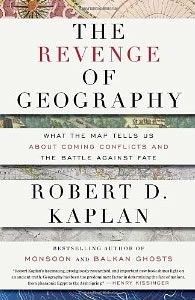Book Notes
 Robert D. Kaplan, The Revenge of Geography; What the Map Tells Us About Coming Conflicts and the Battle Against Fate (New York: Random, 2012), 407pp.
Robert D. Kaplan, The Revenge of Geography; What the Map Tells Us About Coming Conflicts and the Battle Against Fate (New York: Random, 2012), 407pp.
For the last thirty years Robert Kaplan has wandered the world as a foreign correspondent. Many of his books have been regional studies, like Balkan Ghosts, Surrender or Starve about Ethiopia, or Soldiers of God about Afghanistan and Pakistan. His newest book, though, offers an explanatory thesis for the whole history of the whole world. In particular, he's interested in the role of geography in the unfolding of history. The artificial maps of cartography can be very misleading; geography with its empirical logic is the best predictor of where human history is going.
Kaplan rejects geographical determinism. Geography doesn't dictate destiny. Human agency can alter geography, like the Ataturk Dam or the Panama Canal. The internet with its disruptive technologies has erased some of the strictures of time and space. "I am not talking here of an implacable force against which humankind is powerless. Rather, I wish to argue for a modest acceptance of fate, secured ultimately in the facts of geography, in order to curb excessive zeal in foreign policy, a zeal of which I myself have been guilty" (he supported the Iraq war). Artificial borders like the Wall in Israel or the DMZ of the Koreas that don't match the natural features of geography are especially vulnerable.
The power of geography to explain the flow of history leads to a realist stance in foreign policy. Realism respects geography. It is "heartless" and pragmatic, wary of idealistic intervention. Realism has a tragic sensibility. The realist warns, "Don't ever say things cannot get much worse than they are, because they can" (327). Saddam Hussein and Hosni Mubarak were horrible dictators, but who knows what comes next now that they're gone? Thus, Kaplan favors realists like Kissinger and Scocroft against idealists like Fukuyama, and Friedman's idea of a globalized world that "flattens" geography. In the brutal world of the realist, "the search for power is not made for the achievement of moral values; moral values are used to facilitate the attainment of power" (cf. Hobbes and Machiavelli, and Kaplan's book Warrior Politics: Why Leadership Demands a Pagan Ethos).
After describing the power of geography to shape history, Kaplan examines six hot spots of our twenty-first-century map — separate chapters explore Europe, Russia, China, India, Iran, and Turkey. A final chapter offers a counter-intuitive thesis about America. Building on an insight of Andrew Bacevich, Kaplan argues that geography would dictate that Mexico should be our highest foreign policy concern. Most important of all, geography should warn America about any sense of exceptionalism. "There is no special providence for Americans," wrote John Adams, "and their nature is the same as that of others."


